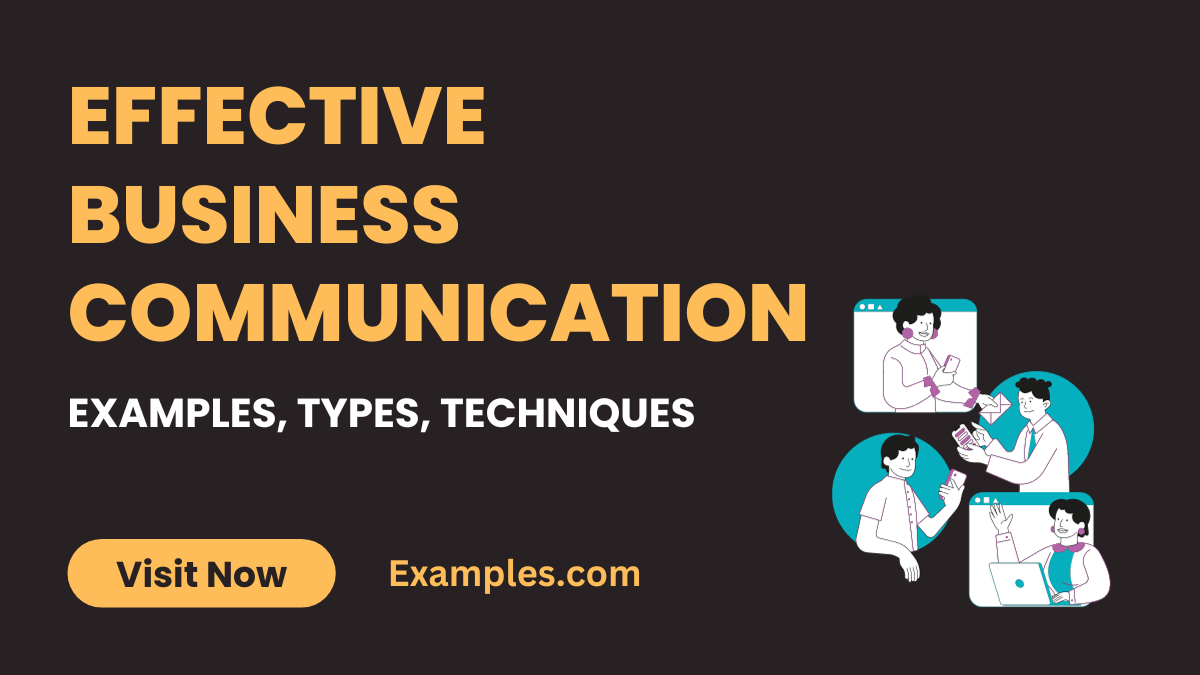19+ Effective Business Communication Examples
Effective Business Communication is pivotal in the corporate world. This comprehensive guide offers a deep dive into the essentials of business communication, incorporating real-world communication examples and best practices. Covering aspects like Corporate Communication Strategies, Professional Email Etiquette, and Interpersonal Skills in Business, it provides actionable insights for improving communication. From Team Collaboration Tools to Cross-Cultural Business Interactions, this guide is a must-read for professionals seeking to refine their communication skills and enhance their business interactions.
Download Importance of Effective Business Communication PDF
What is Effective Business Communication?
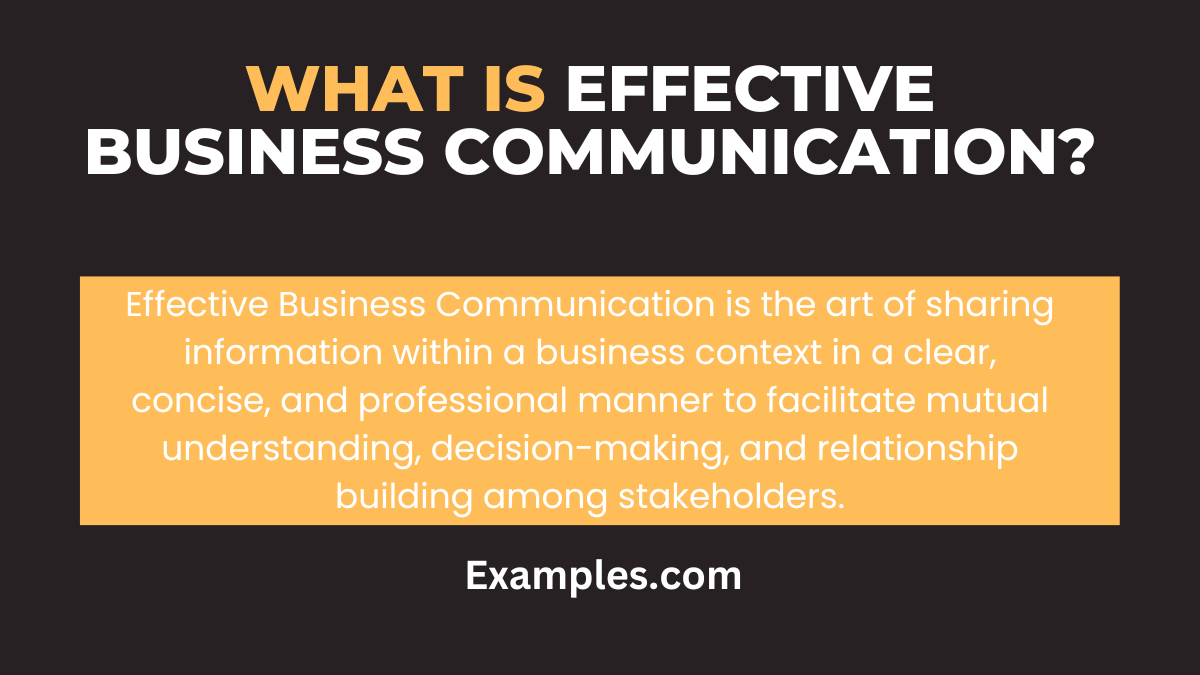
Effective Business Communication refers to the clear, concise, and purposeful exchange of information and ideas within a business context. It involves the use of appropriate communication methods and skills to convey messages in a way that is easily understood and beneficial for both the sender and receiver. This type of communication is essential in fostering positive relationships, ensuring understanding, and facilitating successful business operations. Effective communication can take various forms, including verbal, nonverbal, written, and digital, each tailored to suit different business needs and scenarios.
What is the best Example of Effective Business Communication?
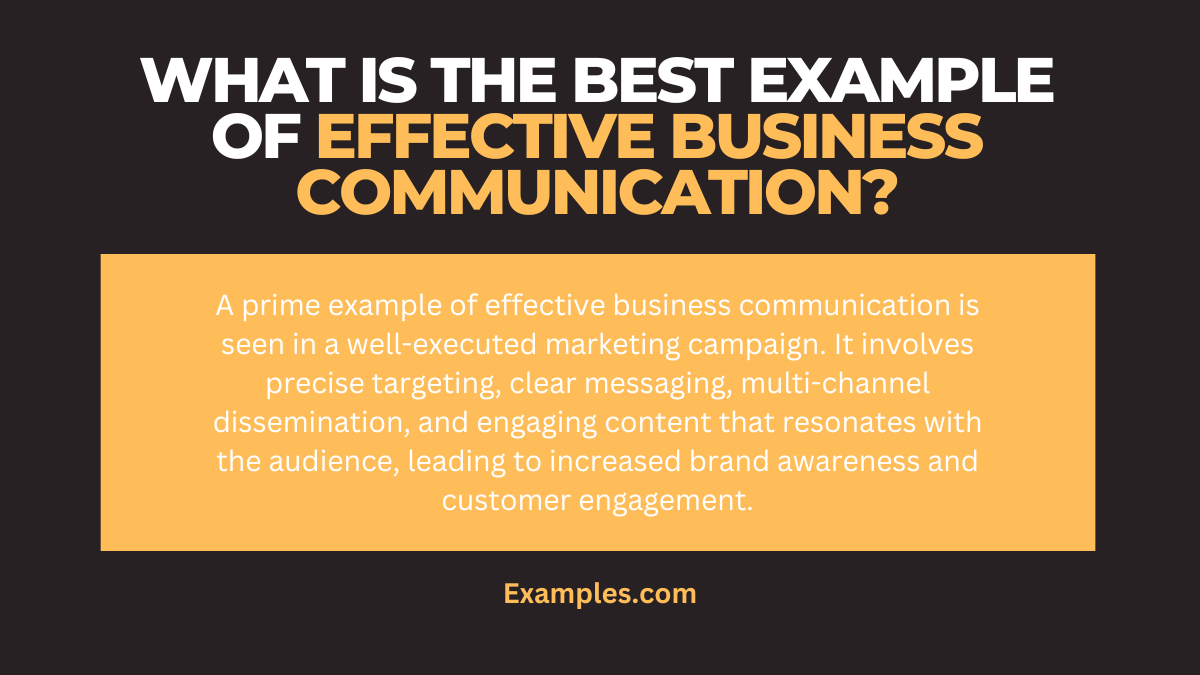
An excellent example of effective business communication is seen in a company’s customer service interaction. This involves clear and concise communication that addresses customer queries and concerns promptly and effectively. For instance, a customer service representative listens attentively to a customer’s issue, provides a clear explanation of the solution, and follows up to ensure satisfaction. This type of communication not only resolves issues efficiently but also builds trust and strengthens the customer relationship with the company. It showcases the importance of understanding, clarity, and responsiveness in business communication.
20 Effective Business Communication Examples
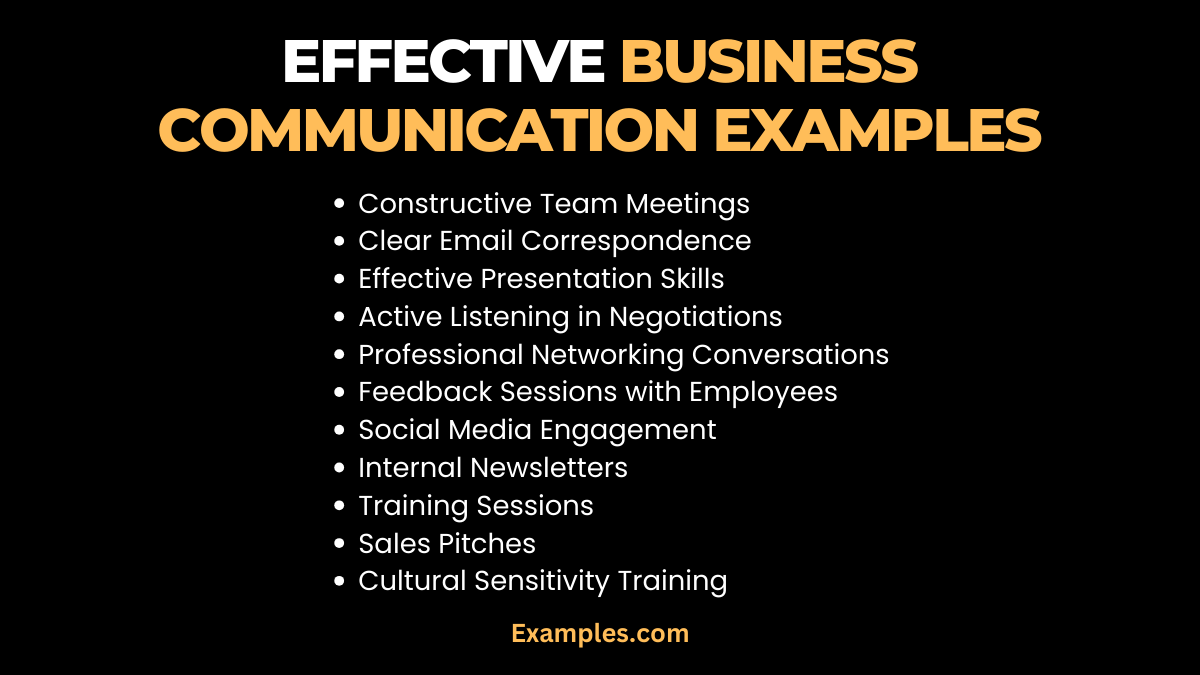
Effective business communication is crucial in today’s corporate world for ensuring successful operations and relationships. This comprehensive approach covers various aspects, from clear verbal exchanges in meetings to well-crafted emails and reports. Effective communication in business settings leads to improved understanding, better decision-making, and enhanced professional relationships.
- Constructive Team Meetings: Encourages collaborative problem-solving.
- Clear Email Correspondence: Enhances understanding and response.
- Effective Presentation Skills: Facilitates information sharing.
- Active Listening in Negotiations: Improves outcomes.
- Professional Networking Conversations: Builds connections.
- Feedback Sessions with Employees: Enhances performance.
- Social Media Engagement: Expands brand presence.
- Customer Service Interactions: Boosts customer satisfaction.
- Crisis Communication: Manages reputation.
- Internal Newsletters: Keeps employees informed.
- Training Sessions: Develops skills.
- Sales Pitches: Drives business growth.
- Project Update Meetings: Keeps teams aligned.
- Conflict Resolution Discussions: Maintains harmony.
- Corporate Announcements: Disseminates important news.
- Market Research Surveys: Gathers valuable insights.
- Performance Review Meetings: Guides employee development.
- Investor Relations Communications: Builds trust.
- Cultural Sensitivity Training: Fosters inclusivity.
- Teleconferencing with Remote Teams: Ensures connectivity.
Effective Business Communication in Organizations
Effective business communication within organizations is integral to achieving operational success and maintaining positive workplace relationships. It encompasses a range of techniques and practices, from clear verbal exchanges during meetings to concise and professional written communication. Effective communication within an organization facilitates efficient decision-making, ensures alignment on projects, and enhances team collaboration. Emphasizing clarity, conciseness, and openness in communication is key to creating a productive and harmonious work environment.
- All-Hands Meetings:
- Informs employees about company updates.
- “In today’s all-hands meeting, we’ll discuss our new business strategy.”
- Interdepartmental Collaboration Emails:
- Enhances cross-department communication.
- “Please find attached the project details for interdepartmental review.”
- Performance Feedback Discussions:
- Provides constructive feedback to employees.
- “Your recent project contributions have been excellent, and here’s how you can grow further.”
- Training and Development Programs:
- Offers skill enhancement opportunities.
- “Join our workshop next week to improve your digital marketing skills.”
- Team Building Activities:
- Strengthens team dynamics.
- “Let’s participate in this team-building exercise to enhance our collaboration.”
Types of Effective Business Communication
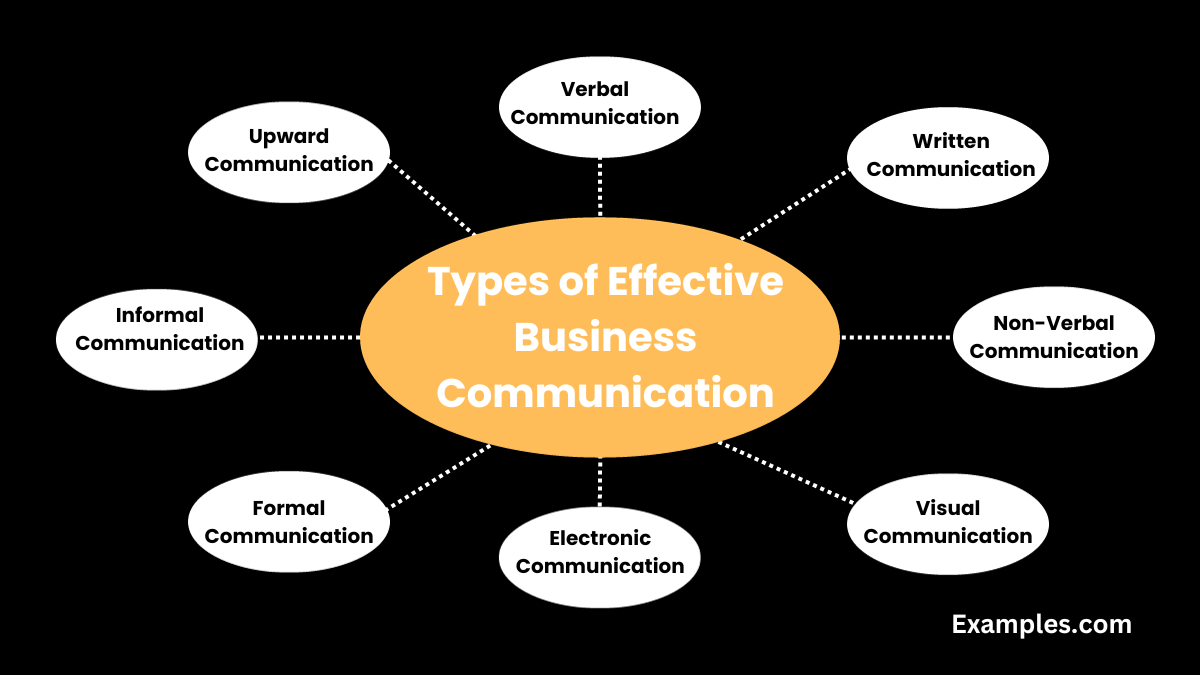
Effective business communication can be categorized into several types, each playing a vital role in fostering clear and productive interactions in the corporate world. Understanding and mastering these types are crucial for any professional aiming to excel in a business environment.
- Verbal Communication:
- Face-to-face or telephonic conversations.
- “In our meeting, let’s discuss the project details thoroughly.”
- Written Communication:
- Emails, reports, and memos.
- “Please refer to the email for the meeting agenda.”
- Non-Verbal Communication:
- Body language and facial expressions.
- “Your confident posture during the presentation conveyed your expertise.”
- Visual Communication:
- Graphs, charts, and videos.
- “The graph in the report clearly shows this quarter’s growth.”
- Electronic Communication:
- Social media, chat applications.
- “Let’s continue this discussion on our Slack channel.”
- Formal Communication:
- Official announcements, documented meetings.
- “The formal report outlines our quarterly performance.”
- Informal Communication:
- Casual interactions, water-cooler talk.
- “During our coffee break, let’s catch up on the team updates.”
- Upward Communication:
- From employees to management.
- “I’ll forward my feedback to the management team.”
- Downward Communication:
- From management to employees.
- “Management has sent guidelines for the new policy.”
- Horizontal Communication:
- Among colleagues or departments.
- “I’ll coordinate with the marketing department for the campaign.
Effective Business Communication Techniques
Effective business communication techniques are key to ensuring clear, concise, and impactful interactions in the corporate world. These techniques involve not just speaking or writing well, but also listening and responding appropriately. From presentations to negotiations, mastering these techniques can lead to improved relationships, better decision-making, and increased productivity in the workplace.
- Active Listening in Meetings:
- Fosters mutual understanding.
- “I hear your concerns; let’s explore solutions together.”
- Empathetic Customer Interactions:
- Builds customer trust and loyalty.
- “We understand your frustration and are here to help.”
- Clear and Concise Emails:
- Prevents miscommunication.
- “Please find the attached report for your review and feedback.”
- Assertive Verbal Communication:
- Enhances clarity and assertiveness.
- “My team will take the lead on this project, ensuring timely delivery.”
- Persuasive Sales Techniques:
- Drives conversions and sales.
- “Our product offers unique benefits that meet your specific needs.”
- Effective Public Speaking:
- Captivates and informs audiences.
- “Today, I’ll share insights that can revolutionize our approach.”
- Nonverbal Communication Cues:
- Reinforces spoken messages.
- [Maintaining eye contact while speaking]
- Constructive Feedback Delivery:
- Encourages growth and improvement.
- “Your report was well-written; consider adding more data analysis next time.”
- Crisis Communication Management:
- Maintains reputation during challenges.
- “We have a plan in place to address this issue and will keep you updated.”
- Cross-Cultural Communication Sensitivity:
- Respects diverse perspectives.
- “I appreciate your viewpoint; let’s find common ground.
What is an Effective Business Communication Strategy?
An effective business communication strategy is a comprehensive approach that ensures clear, concise, and purposeful exchange of information within a business. This strategy involves:
- Understanding the Audience: Knowing who the message is intended for and tailoring the communication accordingly.
- Clear Messaging: Developing messages that are straightforward and easily understood.
- Appropriate Channels: Utilizing the most effective channels for communication, be it emails, meetings, or digital platforms.
- Feedback Mechanisms: Implementing ways to receive and integrate responses from the audience.
- Consistent Review and Adaptation: Continually assessing the effectiveness of the communication and making necessary adjustments.
- Alignment with Business Goals: Ensuring that the communication strategy supports and aligns with the overall objectives of the business.
What are the Importance of Effective Communication?
The importance of effective communication in a communication improvement plan cannot be overstated. Effective communication is crucial for several reasons:
- Enhances Understanding: Clear communication helps in the accurate exchange of information, reducing misunderstandings.
- Improves Productivity: Efficient communication leads to faster decision-making and problem-solving.
- Builds Strong Relationships: Effective communication fosters trust and strengthens relationships within the organization.
- Facilitates Teamwork: It encourages collaboration and teamwork among employees.
- Supports Management Processes: Clear communication is essential for effective management and leadership.
- Boosts Employee Engagement: It creates an environment where employees feel heard and valued.
- Aids in Conflict Resolution: Effective communication is key in resolving misunderstandings and conflicts.
- Enhances Brand Image: Consistent and clear communication improves the organization’s image externally.
What are the Reasons Small Businesses Need Effective Business Communication?
Effective business communication is vital for small businesses due to several key reasons:
- Enhances Team Collaboration: Clear communication fosters better understanding and teamwork, crucial for small businesses where roles often overlap.
- Improves Customer Relationships: Engaging and responsive communication helps in building strong customer relationships, essential for business growth and retention.
- Facilitates Efficient Decision-Making: Accurate and timely information flow aids in making informed decisions, a critical factor for small businesses navigating a competitive market.
- Boosts Productivity: Minimizing misunderstandings and information gaps through effective communication leads to higher productivity and operational efficiency.
- Supports Brand Image and Reputation: Consistent and clear communication portrays a professional image, helping in establishing the brand in the marketplace.
What are the Types of Most Effective Business Communication?
The most effective types of business communication include verbal communication (meetings, calls), written communication (emails, reports), nonverbal communication skills (body language, gestures), and visual communication (presentations, charts). Each type plays a crucial role in conveying clear and impactful messages in a business setting
In summarizing the importance of effective business communication, it’s clear that mastering this skill is crucial for any business’s success. It’s not only about sharing information but also about building relationships and understanding stakeholder needs. For more detailed Steps to Better Effective Business Communication and tips, and Slack for in-depth insights into effective communication techniques in the business environment. These resources offer practical advice that can be applied to various business contexts.



